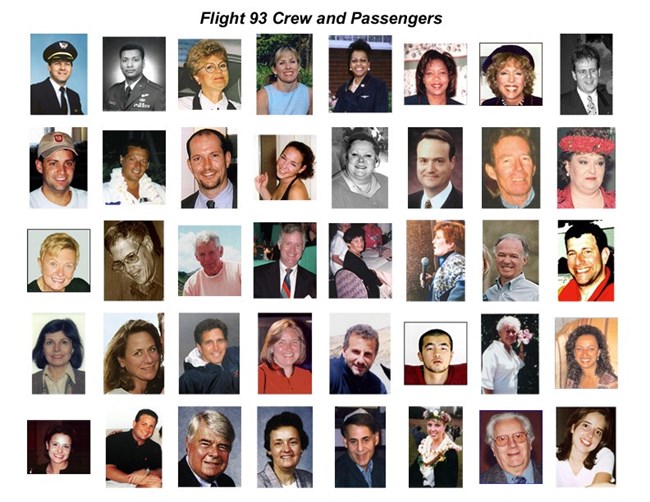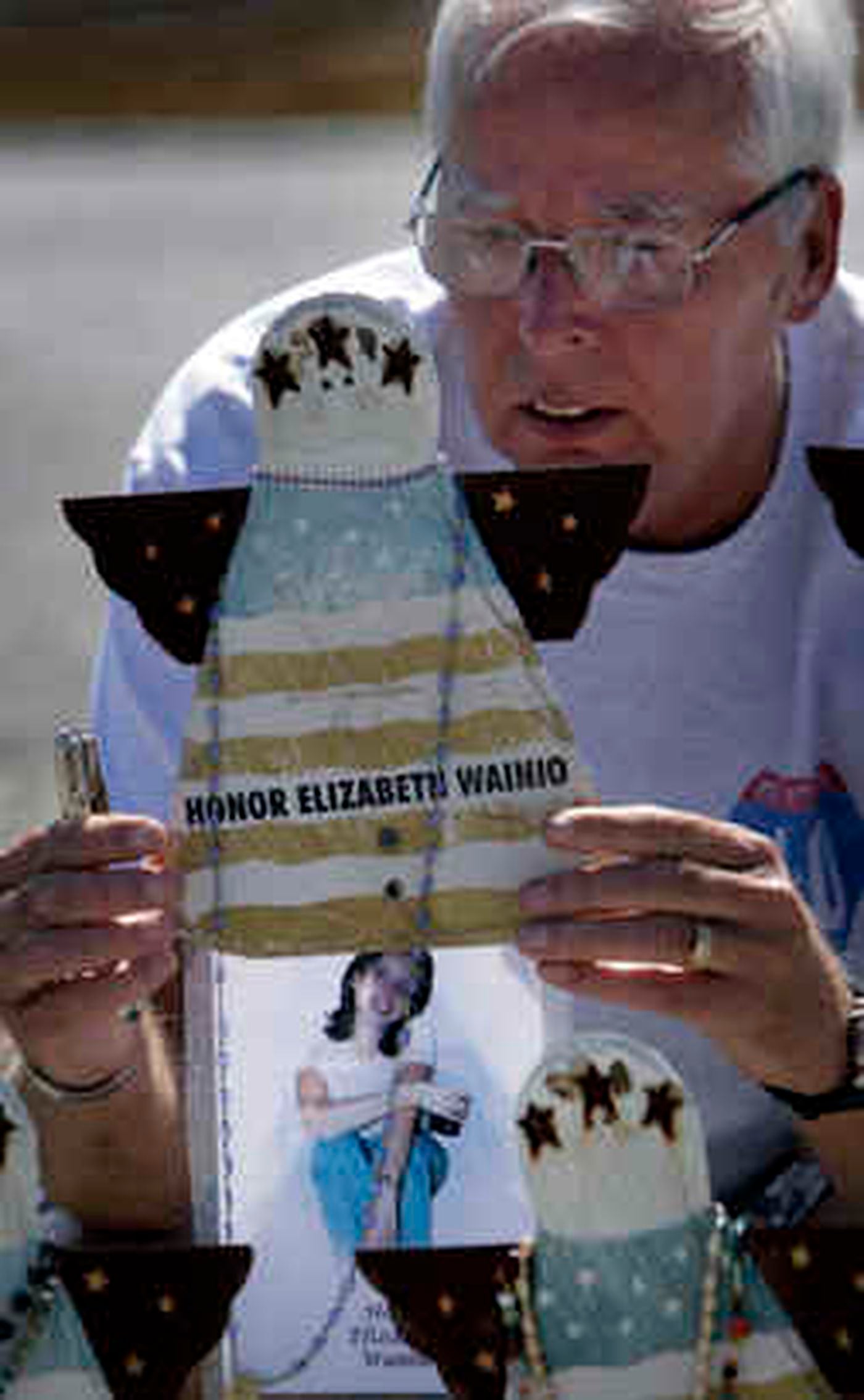 |
| Honor Elizabeth Wainio's photo is in the bottom righthand corner |
Note: This
piece was first published in the Daily American,
Somerset Pa., in September 2011, four months after the death of Osama Bin
Laden.
Now that Bin
Laden is dead, I
wonder what Esther thinks. I met her one bright morning in March 2011, on
Manasota Beach in Venice, Florida.
My
daughter Kelley was further along the beach that day, absorbed in her search
for shark’s teeth. Even though she’s 39 years old, I couldn’t help looking up
constantly, trying to spot her among the other shell seekers. When she’s in my
presence, she’s my little girl.
I
noticed a woman moving slowly along the waterline, bending over occasionally to
sift through the seaweed and broken shells that lay strewn on the sand. We were
looking in the same patch and smiled at each other. Even though her grey hair
was piled up on her head in a casual fashion, I judged her to be younger than
me. She had a deep tan.
Something
in her eyes made me speak to her. “Beautiful
day for the beach.”
“Yes,”
she replied. “Coming to Florida and
looking for shells brings me peace.”
“I’m
Donna,” I said.
“Esther,”
she replied.
 |
| Elizabeth (L) and her sister Sarah (R) |
We
started talking about stress and the need for activities that offer relief from
daily worries. I felt connected to this
woman; her gaze was direct and there was a deep sadness about her.
“I’ve
lost a child,” she said.
I
told her I’d lost a child too, and marvelled at myself for not breaking down
and sobbing to this stranger.
“My
daughter Elizabeth was killed on September 11, 2001, on Flight 93, the one that
crashed in Shanksville, Pennsylvania.”
Stunned,
I reached out to take her hand. “Our son Matthew died of pneumonia last July
after four months in hospital. He was 40
years old.”
“Elizabeth
was 27,” said Esther. “She called me
from the plane that day to say good-bye. The person next to her had made a
final call to a loved one and handed her the phone. Thank God I was home. ‘Do
you know what’s going on, Mom?’ she asked.”
I
couldn’t imagine receiving a phone call like that one. I’d dreaded the calls
from Oakville Hospital telling us Matthew was worsening and we should get there
as soon as possible. I scanned the beach for Kelley while Esther continued
talking.
“Even
though I’d heard what was happening, I told her I didn’t know. I didn’t want to
break down and waste this last conversation with my daughter. I had a horrible
feeling she was on that flight because she was flying out of Newark that day.”
I
wondered if I could have done that and not given in to my first reaction of
terror and despair. And I couldn’t imagine how anyone would ever be able to
hang up the phone knowing they would never hear that voice again.
“After
about five minutes, Elizabeth told me she had to hang up soon. Someone else
wanted to make a call.”
Watching
Matthew becoming sicker during the last months of his life was hard for me. I
knew he would die, but at least I could support him during that process and
take comfort in the luxury of still having him.
“Elizabeth told me she loved me and she’d
accepted that she was going to die, and would be reunited with her
grandparents. She was such a bright girl, with so much to offer the world.”
Matthew
was bright too, I thought, even though he was mentally and physically
handicapped. He taught us to see the value of life in a different way and the
meaning of dedication, persistence and love.
“She
said some of the passengers planned to overpower the terrorists and try to take
the plane back.”
 |
Elizabeth's
father, Ben, adjusts a photo
of Elizabeth at the temporary memorial initially erected at the crash site |
Esther
and Elizabeth had mere moments to come to terms with imminent death. My husband and I knew for months our son
would never recover. Even so, we couldn’t accept it, and Matthew’s passing on
July 6, 2010, was a shock to us.
“Nearly
3,000 people died that day,” said Esther. “If the passengers and crew aboard Flight
93 hadn’t intervened, the terrorists would have crashed the plane into the
White House and more would have died.”
I
knew nothing about the details of the fated Flight 93 and wondered how many
times Esther had told this story. Perhaps it was her mission - to give meaning
to the atrocious death of her daughter. Without the brave actions of the
passengers on Flight 93, the tragedy would have been worse.
I
understood her need. I wanted the world to understand the importance and worth
of differently-abled people like Matthew.
I
spotted Kelley coming towards us, smiling and opening her hand, full of shark’s
teeth. “Got some really big ones, Mom!”
We
watched Kelley continue towards her father who was seated under our beach
umbrella reading his crime novel.
“Your
daughter?” asked Esther.
“Yes.”
“She’s
lovely.”
I
told her we had another son, our youngest child, Joseph.
“Do
you ever get the feeling that because you have other children people think it
somehow makes the loss easier?” asked Esther.
I
nodded. It also hurt me to know that some felt the life of a handicapped person
was not as valuable as the lives of people they could more easily identify
with. Even though no one had ever spoken those words, I knew by their
expressions and by the way they articulated their condolences. It was my wish
to change those attitudes.
“No
child can replace another,” said Esther.
She
and I stood looking at each other, and clasped hands.
Nearly
a decade after the crash of Flight 93, Bin Laden is finally dead. How does
Esther feel? I’d love to talk to her again.
Donna Kirk’s memoir, Finding Matthew, was
published in 2012. Her novel, Accidental Courage, is looking for a publisher. Donna has published short stories
in medical journals, magazines and newspapers. Read more about Finding
Matthew here.


No comments:
Post a Comment
Note: Only a member of this blog may post a comment.